Select a topic to learn more
How we feed our cats is as important as what we feed them
Ban the Bowl
It’s no wonder that most people use bowls to feed their cats, since pet stores sell a large variety specifically for this purpose. Research shows that cats can be irritated by a bowl’s contact with their whiskers. Whiskers are a cat’s antennae for feeling. They go deep below the skin to connect with the nervous system and help cats navigate their environment. “Whisker fatigue” is a real issue and causes cats to feel stressed or agitated. Most cats prefer that you offer food on flat dishes that won’t make contact with whiskers and consider other feeding methods such as puzzles, dispensers and “hunting” activities like hiding kibble throughout your home. More on these ideas coming up!
Calories Count
Calorie counting isn’t just for humans on diets. It’s important to every living creature on the planet to achieve and maintain optimal nourishment and health. Feeding your cat appropriate portions is the #1 way to prevent or treat obesity and all the other complications that come with it. Every bag and can of cat food should display its caloric content and using a gram scale to portion food is the most accurate way to get it right every time.
When determining your cat’s individual needs, your best resource is your cat’s veterinarian. If your cat is under or overweight, prioritize this issue and contact your vet’s office for a nutrition consultation. This service is generally complimentary if you bring your cat in for yearly check-ups and even more likely if you purchase your cat’s food from there.
Did you know that more than half of domestic cats in North America are overweight or obese and yet most cat owners are unaware? The internet bombards us with images of chubby cats with the intention to make us laugh and smile – and it works! Chubby cats are adorable, but so are healthy cats. The problem is that we subconsciously associate larger cats with being more lovable and minimizing the importance of associating a healthy body condition score with a happier and healthier life.
What do we mean by body condition score (BCS)? It’s a tool to help us assess fat accumulation on an animal’s body and measure how much too much or too little your cat is carrying. It’s a better indicator of obesity than the scale alone and anybody can use it.
Puzzles Do Some Solving, Too
Your cat is smart. He’s likely a lot smarter than he’s given credit for. Does he ever look down at you from atop the bookcase with that demoralizing, “You know nothing” glare. Well, you can help him prove those smarty cat skills by putting his kibble in a puzzle. Beyond the problem solving fun, the puzzle feeder will help to:
- Slow down eating, thereby improving digestion of the food
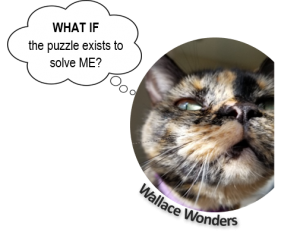
- Provide stimulation and fun for much longer than it takes to eat from a dish
- Get your cat moving, which assists in weight management
- Reduce begging behaviour often associated with boredom
- Improve and maintain cognitive function as the cat ages
- Get really cute Instagram videos
- Cover our first point about banning the bowl
There are hundreds of feeding puzzles on the market and they can be very different from each other. Start your cat with simple puzzles so he can get used to the idea and find the process rewarding early on. Try a DIY puzzle if you’re hesitant to purchase one right away. Click here to see some of our own DIY ideas and here to watch Wallace work on some advanced dog puzzles!

When There’s More Than One Mouth to Feed
Here’s a scenario many can relate to. You have three cats and one dog. Two cats are on a weight loss diet and you measure their portions carefully. A third cat is 17 years old; she eats a special age-appropriate diet and takes her time eating, sometimes leaving a little behind in her bowl. The first two cats are always starving and they race each other to finish their meals to get to the older cat’s leftovers; having an argument if they get there at the same time. Meanwhile, the dog is barking because she wants cat food, too!
Somehow, mealtime has become a stressful event for everyone. The overweight cats don’t seem to get along when they eat in the same room and they’re always competing against each other for the older one’s leftovers.The older cat is agitated by the barking and is anxious about the other two rushing over to argue over her dish. She rarely finishes her meals, despite being hungry, because she is too upset to stay long enough. Despite your best efforts to help, you’re also getting upset. The overweight cats aren’t slimming down and since the older one is losing weight, you’re worried she may be sick.. The dog, well, she will always be jealous of her feline superiors.
If you relate to this hypothetical situation, consider:
- Slow feeders/puzzles for the overweight cats
- Feed the older cat somewhere private and quiet, allowing her to eat at her own pace free from fear. She should have plenty of time with the other two slowed down
- If your schedule doesn’t allow for supervising this closely, microchip feeders are an excellent way to make sure each cat only eats their designated food – especially important when medical diets are involved
- Address the dog’s behaviour through positive reinforcement (ideally with an experienced trainer). It’s critical for cats and dogs sharing a home to have respectful relationships with one another


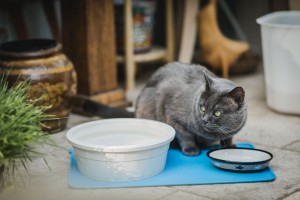
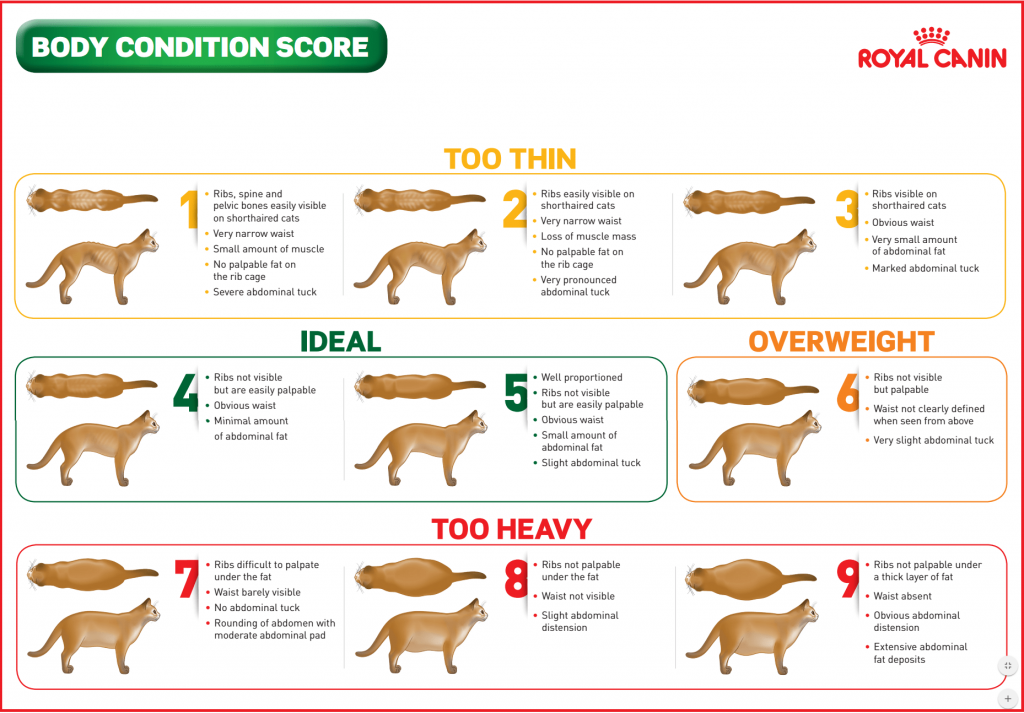

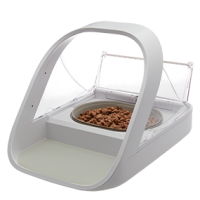
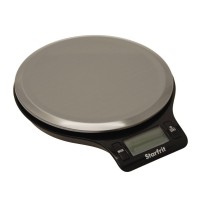

 Start with a huge, uncovered box, or even a kiddie pool, and fill with a thick layer (about 6 inches) of unscented clay or fine sand-like particulate clumping/scoopable litter. For Ollie, you may need to play around with the substrate types to make it more natural. Try using soil or peat.
Start with a huge, uncovered box, or even a kiddie pool, and fill with a thick layer (about 6 inches) of unscented clay or fine sand-like particulate clumping/scoopable litter. For Ollie, you may need to play around with the substrate types to make it more natural. Try using soil or peat.